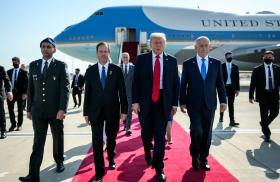
- Policy Analysis
- PolicyWatch 2761
The Trump-Netanyahu Meeting in the Context of Emerging U.S. Middle East Policy

The two leaders will need to figure out where Israel's pressing concerns about Iran fit in with the Trump administration's emerging regional policy, particularly its emphasis on quickly destroying the Islamic State.
The following is an edited version of remarks delivered by executive director Dr. Robert Satloff to a Washington Institute Policy Forum on February 8. Watch video of the entire event, or read remarks by co-speaker David Makovsky.
Israeli prime minister Binyamin Netanyahu arrives in Washington at a time when the new administration, still in its early days of personnel selection, is also grappling with a series of paradoxes emerging from statements and commitments made over the past year by Candidate Trump, President-elect Trump, and President Trump.
MAIN GOALS OF TRUMP MIDDLE EAST POLICY
Drawing on Donald Trump's record, one can identify four main strategic objectives in his U.S. Middle East policy:
1. The United States will swiftly and completely "destroy" the Islamic State (IS) -- not "degrade," "shrink," or "contain" it, but destroy it -- in the context of a broader campaign against the ideologues and implementers of "radical Islamic extremism." One result is that friends and allies will increasingly be defined as those who share these goals and contribute to this effort. Among Arab countries, the chief beneficiary is likely to be Egypt; among non-Arab countries, Turkey.
2. The United States will "get tough" on Iran -- this is variously defined as "ripping up" the nuclear deal or "enforcing the hell" out of it, but always against a backdrop of pushing back on Tehran's negative behavior throughout the region.
3. The United States will make sure that allies such as Saudi Arabia and other Gulf Arab states pay their share for collective defense.
4. The United States will restore friendship with Israel on a strategic and political level. While President Obama showed that America can both invest in the military/security/intelligence relationship and maintain a strategic/political relationship rife with tension, dispute, and personal animosity, the new administration will repair this, with the goal of bringing all aspects of the relationship under the umbrella of partnership.
CORE PARADOXES FOR TRUMP MIDDLE EAST POLICY
These four objectives immediately highlight five contradictions:
1. Destroying IS, one of the president's few clear foreign policy commitments, may be urgent, but pushing back on Iran is important, perhaps more so. Indeed, rolling back Tehran's power projection in the Middle East -- represented by its influence in Iraq and its control of powerful proxies and militias elsewhere -- might even be a prerequisite for destroying IS. How should the United States reconcile these twin objectives?
2. If Russia proves to be a helpful partner in destroying IS, how can that partnership be exploited without strengthening Moscow's chief Middle East ally, Iran? Driving a wedge between them is a sound idea in principle, but a difficult policy to execute.
3. Destroying IS would be a pyrrhic, short-lived victory unless the United States and its partners take steps to ensure it is not replaced by yet another generation of radical Sunni jihadists. While non-Arab Sunnis -- Turks and Kurds, for example -- can play a major role in the military destruction of IS strongholds in Iraq and Syria, only Sunni Arabs can provide the leadership, governance, and service delivery that are the best defense against the rise of al-Qaeda 4.0. Doesn't that require an effective partnership among all relevant Sunni actors, including Sunni Arab states led by Saudi Arabia?
4. Egypt may be the biggest political beneficiary of the new focus on Islamic extremism, but beyond a White House embrace, how will the Trump administration address Cairo's need to monetize this renewed friendship to address Egypt's destabilizing economic problems?
5. For Israel, the new bilateral relationship with Washington is almost certain to be warm and robust; indeed, the personal relationship between Trump and Netanyahu has the potential to develop into the sort of friendship and partnership enjoyed by Bill Clinton and Yitzhak Rabin. But the paradox is that Israel's real strategic need from Washington goes far beyond the bilateral relationship. What Israel -- along with other longstanding U.S. allies in the region -- really needs is a reassertion of American leadership after a period of perceived indifference by the Obama administration. Is President Trump ready and willing to be a committed and effective captain of the pro-West team of regional states, with all that entails for deepening U.S. involvement in the region's complex challenges?
THE NETANYAHU AGENDA
For Netanyahu, the Trump meeting is one of the most consequential of his prime ministry. It will set the tone of his relationship with the new president and define the new ground rules governing strategic/political coordination (as well as inevitable conflict) in the next phases of the U.S.-Israel relationship.
In this regard, the top priority for Netanyahu is to educate the new president on the priority of confronting the many aspects of the Iran threat and to focus U.S.-Israel strategic cooperation on that effort. The challenge is to do this without directly confronting the president's public commitment to prioritize the destruction of IS.
Another high priority for Netanyahu is to reach understandings with Trump on the Israeli-Palestinian peace process in general, and on Israeli settlement activity more specifically. During the Obama administration, a profound dispute over the centrality of settlement activity to the larger conflict and the need for its total cessation immediately produced a U.S.-Israeli clash and an Israeli-Palestinian impasse. It is in the interest of both Netanyahu and Trump to reach an agreement on settlement activity that removes this as a thorn in the relationship. To meet its political objectives, such an agreement would need to preserve Trump's freedom of maneuver to pursue his stated goal of eventually negotiating a permanent peace deal, while also allowing Netanyahu to return to Israel with a substantial enough victory so he can withstand the growing pressure from his right wing to approve settlement plans whose only real intent is to prevent any possible peace accord. While this is an achievable goal -- George W. Bush and Ariel Sharon reached such an agreement, for example -- it would require the Trump team to draw on a reservoir of historical memory and diplomatic expertise that they may not yet have on staff.
In this context, the decision to move the U.S. embassy to Jerusalem -- which Israelis across the political spectrum would applaud -- could play a role in the effort to strengthen Netanyahu's hand against the more extreme members of his coalition. After all, an embassy move would likely be accompanied by a U.S. expression of appreciation for Israel's agreement that the permanent status of Jerusalem will be determined in negotiations, the outcome of which the United States will support. That, however, would be viewed as a poison pill by the hard right, which considers any suggestion of negotiation over Jerusalem anathema.
The timing of a potential embassy move is crucial as well. If the president is committed to implementing it, he should probably do so quickly, within the next several weeks. What he wants to avoid is intermingling the embassy issue -- which essentially repairs a diplomatic error made by the Truman administration seven decades ago -- with commemoration of the fiftieth anniversary of the June 1967 Six Day War and the "reunification of Jerusalem." Thanks to the Hebrew calendar, that commemoration falls in late May this year, almost exactly when the current six-month waiver of the Jerusalem Embassy and Recognition Act expires. If the president wants to move forward on this issue, he should do so well in advance of that date, lest he inadvertently feed any Palestinian sense of provocation and outrage.



